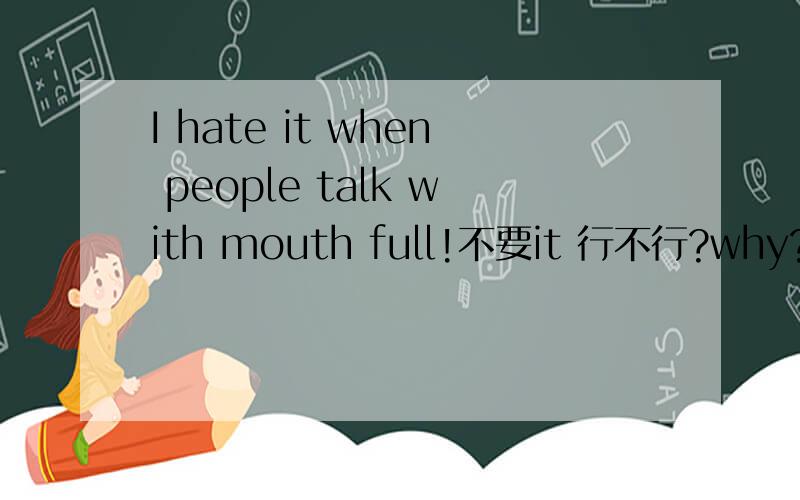I hate it when people talk with mouth full!不要it 行不行?why?
来源:学生作业帮助网 编辑:作业帮 时间:2024/11/20 04:45:49

I hate it when people talk with mouth full!不要it 行不行?why?
I hate it when people talk with mouth full!不要it 行不行?why?
I hate it when people talk with mouth full!不要it 行不行?why?
hate是不能接宾语从句的.
it引导了一个同位语从句.
so要有it.
不行,那是形式宾语,去掉后句子就不完整了,缺少宾语
从句WHEN PEOPLE ....是修饰IT的,指IT的具体内容。
同时I HATE 后面应该是名词,所以整句话的结构按照中文应该为
我讨厌PEOPLE TALK WITH MOUTH FULL(的这件事)
IT代指这件事,然后WHEN 。。。对这件事进行了具体的描述。
IT是句子里的宾语,也就是主要的部分,如果提炼整句以主谓宾的形式,就是I HATE IT,比如...
全部展开
从句WHEN PEOPLE ....是修饰IT的,指IT的具体内容。
同时I HATE 后面应该是名词,所以整句话的结构按照中文应该为
我讨厌PEOPLE TALK WITH MOUTH FULL(的这件事)
IT代指这件事,然后WHEN 。。。对这件事进行了具体的描述。
IT是句子里的宾语,也就是主要的部分,如果提炼整句以主谓宾的形式,就是I HATE IT,比如I LIKE APPLE THAT IS RED,我喜欢红的苹果,句子主要成分是我喜欢苹果I LIKE APPLE,然后才是修饰苹果——红的那种THAT IS RED。
所以虽然有的从句可以省略IT THAT,但是IT在这里省略不合适。
收起
I hate IT when people talk with THEIR mouth full.
I hate when people talk with THEIR mouth full.
or
I hate it when people talk with a full mouth.
I hate when people talk with a full mo...
全部展开
I hate IT when people talk with THEIR mouth full.
I hate when people talk with THEIR mouth full.
or
I hate it when people talk with a full mouth.
I hate when people talk with a full mouth.
都可以说
IT in "I hate IT when people talk with THEIR mouth full." refers to meaning #5 below...
it
pron.
1. Used to refer to that one previously mentioned. Used of a nonhuman entity; an animate being whose sex is unspecified, unknown, or irrelevant; a group of objects or individuals; an action; or an abstraction: polished the table until it shone; couldn't find out who it was; opened the meeting by calling it to order.
2. Used as the subject of an impersonal verb: It is snowing.
3.Used as an anticipatory subject or object: Is it certain that they will win?
4.Used as an anticipatory subject to emphasize a term that is not itself a subject: It was on Friday that all the snow fell.
5. Used to refer to a general condition or state of affairs: She couldn't stand it.
6. Used to refer to a crucial situation or culmination: This is itthe rivals are finally face to face. That's it! 7. I won't tolerate any more foolishness.
8. Informal. Used to refer to something that is the best, the most desirable, or without equal: He thinks he's it. That steak was really it!
http://www.dictionary.com
收起